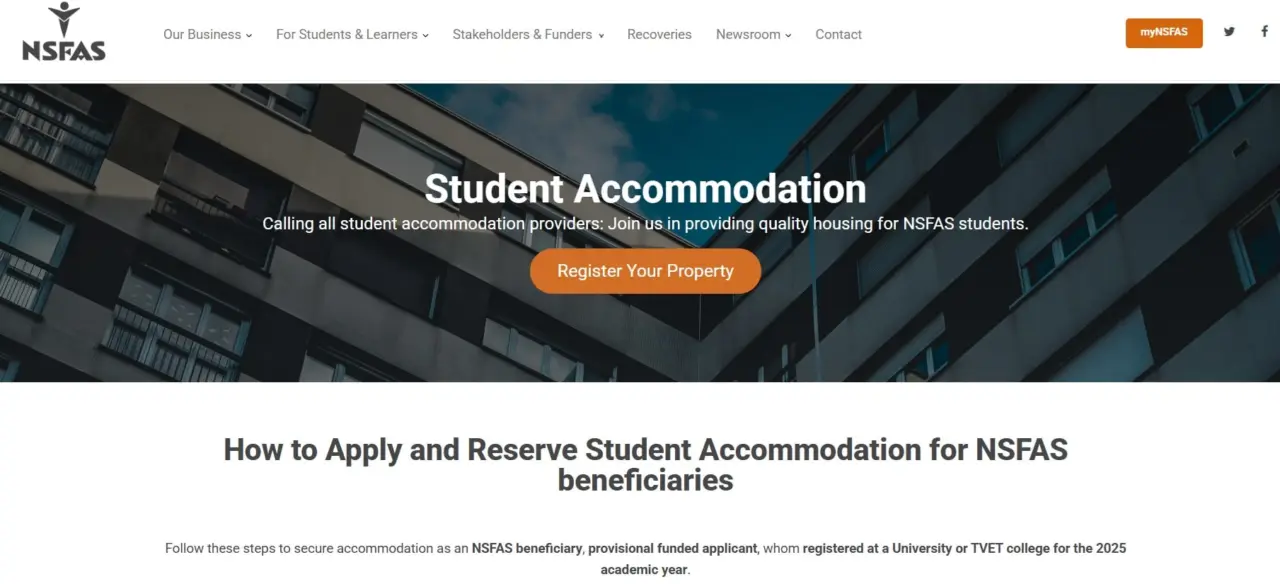NSFAS Allowance Payment 2025 Dates Out: For South African college students from underprivileged backgrounds, the National Student Financial Aid Scheme (NSFAS) is critical. It finances monthly allowances to cowl dwelling fees, housing, and tuition costs. Knowing the NSFAS Allowance Payment Dates is essential for college kids to nicely plan their price range and is one of the maximum crucial components of NSFAS funding.
For qualified college students attending public universities and Technical and Vocational Education and Training (TVET) faculties, NSFAS gives financial resource. The cause of these allowances is to reduce the economic pressure on students and their households whilst additionally masking the expenses of better education. Ten month-to-month bills of NSFAS allowances are made during the instructional yr, which typically lasts from February to November. This means that only at some stage in these months do college students get paid.

NSFAS Allowance Payment Dates for February 2025
NSFAS will distribute allowances for February 2025 in the manner described below:
Students at Universities:
- Allowance Distribution: College student’s allowances will be disbursed by their respective institutions. The implementation of direct bills to college students has been postponed via NSFAS due to on-going felony complaints.
- Important Steps: To confirm an appropriate NSFAS Allowance Payment Dates for February, students are suggested to get in touch with the economic resource workplace at their university.
Students at TVET Colleges:
- Disbursement of Allowances: TVET college students will get their allowances deposited straight into their bank accounts.
- Direct Payment System: To prevent delays, TVET students must make sure their banking information on the myNSFAS portal is correct.
- Timeline Estimate: TVET students should receive their payments in the first two weeks of February 2025.
The following are the payment dates for the 2025 cycle:
| First Semester | |||
| Cycle | Place | Day | Date |
| Cycle 1 | All Campuses | Monday | 28 February 2025 |
| Cycle 2 | All Campuses | Monday | 7 March 2025 |
| Cycle 3 | All Campuses | Monday | 4 April 2025 |
| Cycle 4 | All Campuses | Monday | 3 May 2025 |
| Cycle 5 | All Campuses | Monday | 6 June 2025 |
| Second Semester | |||
| Cycle 6 | All Campuses | Monday | 18 July 2025 |
| Cycle 7 | All Campuses | Monday | 1 August 2025 |
| Cycle 8 | All Campuses | Monday | 5 September 2025 |
| Cycle 9 | All Campuses | Monday | 3 October 2025 |
| Cycle 10 | All Campuses | Monday | 7 November 2025 |
NSFAS Funding Includes
- Tuition Fees: Among the expenses covered by NSFAS funding are tuition fees, which are given to schools directly.
- Accommodation: Pays for private housing or living expenses.
- Transport Allowance: Students who live off campus are eligible for a transportation allowance.
- Learning Resources: A set yearly budget for books and supplies.
- Personal Allowance: Monthly payments for everyday living expenses are known as personal allowances.
In accordance with the academic calendar, these allowances are paid out over a ten-month period, from February to November. Comprehending the NSFAS Allowance Payment Dates is essential to guaranteeing that students can manage their finances efficiently all year long.
NSFAS 2025 Allowance
Here are the amount differs slightly between college and university, check the given table :-
TVET College Allowances:
| Accommodation in an urban area | R24 000 yearly or R2 400 monthly |
| Accommodation in a peri-urban area | R18 900 yearly or R1 892 monthly |
| Accommodation in a rural area | R15 750 yearly or R1 575 monthly |
| For transportation (up to 40 kilometers from the institution) | R7,350 yearly or R735 monthly |
| Transport | R7000 yearly or R700 monthly |
| Personal care allowance | R2 900 yearly or R290 monthly |
University Allowances:
| Accommodation | According to what the university actually charges (prices for private housing cannot be higher than those for university housing). |
| Transport (up to 40 km from the institution) | R7 500 yearly or R750 monthly |
| Living allowance | R15 000 yearly or R1 500 monthly |
| Book allowances | R5 200 yearly |
| Personal care allowance | R2900 yearly or R290 monthly for students in catered residences |
Upload Information for Payments of TVET NSFAS Allowance
The ability to add banking information is restricted to students who have submitted registration information and received confirmation of funding.By taking these easy steps, college students can update their banking data on the myNSFAS portal
Ep 1: Go to the myNSFAS internet site at https://www.Nsfas.Org.Za/.

Step 2: After that, enter your myNSFAS login information.
Step 2: After that, enter your myNSFAS login information.
Step 3: Now, you need to click on at the “Profile Information” after which hit the “Bank Account Details” link.
Step 4: After that, you want to go into your bank facts efficiently after which press “Save.”
Step 5: To save you any price delays, students are advised to preserve up with NSFAS updates and make sure their i
Process to Claim NSFAS Allowance Payment in February 2025
Take these crucial actions to guarantee that your NSFAS Allowance is received on time:
Step 1: It is essential for students who receive direct payments to update and confirm their banking details on the myNSFAS portal. Here’s how:
- Open the myNSFAS portal and log in.
- Visit your profile and select “Bank Account Details.”
- After that, enter the details of your current, accurate bank account.
- Save the most recent data.
Step 2: Verify your eligibility for 2025 NSFAS funding. To accomplish this:
- Open the myNSFAS portal and log in.
- Go to the “Funding Status” phase and verify that the repute of your software is “Approved.”
Step 3: Regularly check the following to stay informed about official announcements regarding NSFAS Allowance Payment Dates:
- The website of NSFAS.
- Your SMS and email alerts.
- Social media sites run by NSFAS, including Facebook and Twitter.
Step 4: To confirm payment schedules, university students should get in touch with their financial aid office on a regular basis. Allowances may be disbursed according to slightly different schedules at each university.
Canada Minimum Wage Increase Again In March 2025-Check Amount And Province Increase
Typical Problems and their Solutions
1. Postponed Payments
- What to Do: To find out the status of your payment, get in touch with NSFAS or your financial aid office.
- Proactive Tip: To prevent needless delays, make sure your banking and personal information are accurate.
2. Inaccurate Bank Information
- Solution: Update your information right away by logging into the myNSFAS portal. One of the most frequent reasons for late payments is inaccurate or out-of-date banking information.
3. Not Enough Money
- Verify Your Allowance Breakdown: To make sure you are getting the right amount, check the funding allocation on the myNSFAS portal.
- Speak with NSFAS Support: Report any inconsistencies to the financial aid office at your school or NSFAS.
Advice for NSFAS Allowance Recipients on Budgeting
Getting your allowance on time is just half the fight. The following budgeting advice will help you maximize your money:
1.Start with the requirements: Before you spend your allowance on other things, set apart cash for necessities like food, transportation, and observe materials.
2. Adhere to a spending plan: To control your spending and make certain your cash lasts till the next payment, create a primary price range plan. A pocket book or budgeting apps can be useful.
3. Have Emergency Funds: A small portion of your allowance should be set aside for unforeseen costs or emergencies.
4. Steer clear of debt: Don’t depend on credit or loans unless it’s absolutely required. The purpose of NSFAS allowances is to provide for your basic necessities.
Significance of Comprehending NSFAS Allowance Payment Dates
It’s critical to apprehend the NSFAS Allowance Payment Dates for some of motives.
- Financial planning: Assists students in efficiently allocating funds.
- Preventing Stress: Prevents worry brought on by unforeseen payment delays.
- Academic Focus: Frees students from worrying about money so they can concentrate on their studies.

